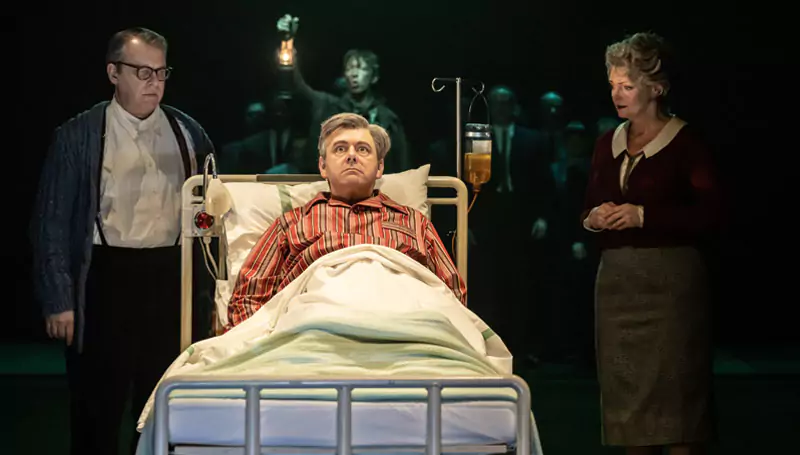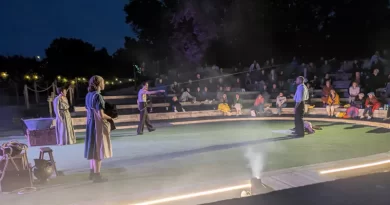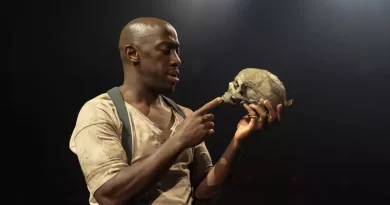“Nye” at the Olivier, National Theatre
Neil Dowden on the South Bank
13 March 2024
Tim Price’s new play Nye is an entertaining if episodic portrait of Aneurin (“Nye”) Bevan, the Welsh Labour politician who brought the National Health Service into being in 1948. Rufus Norris’s bravura staging makes full use of the huge Olivier stage at the National Theatre (in a co-production with Wales Millennium Centre, where the show will transfer) with a 24-strong cast led by a brilliant performance from Michael Sheen. It may verge on being a eulogy to the charismatic socialist, but it’s difficult not to warm to a play that is also a tribute to the post-war NHS which improved the lives of so many people.

Michael Sheen and Rhodri Meilir.
Photo credit: Johan Persson.
Fittingly enough, Nye begins and ends with Bevan in hospital in 1960 after an operation for stomach cancer which soon kills him at the age of 62 – indeed most of the action is in the form of flashbacks and hallucinogenic dreams he has while on morphine lying in his deathbed, with Sheen barefoot wearing striped pyjamas throughout. In a kaleidoscopic drama, we see him growing from boy to man in the coal-mining town of Tredegar in South Wales, as he moves from working down the pit to representing the union and becoming a county councillor, before being elected MP for Ebbw Vale and making impassioned speeches in the House of Commons, where he meets his future wife and fellow socialist Jennie Lee, and after the war making the NHS become a reality against all the odds.
There are many powerful scenes: a schoolteacher caning Bevan for being unable to recite a poem because of his stammer, with the whole class coming together to resist the abuse of power in a show of working-class solidarity; his discovery of a free lending library where he can educate himself, and learn new words that can circumvent his speech impediment; his collier father dying in his arms from pneumoconiosis (“black lung”, from inhaling coal dust); his pugnacious maiden parliamentary speech in 1929 attacking Winston Churchill for his recent policies as Chancellor of the Exchequer.
The war years are rather skated over (Bevan opposed Churchill’s coalition government, as he had opposed rearmament before the war), while his change of mind in favour of the UK having the hydrogen bomb when he was Shadow Foreign Secretary in the late 1950s is omitted. The play neglects the more contentious aspects of Bevan’s career in favour of his campaigns for social justice and equality, especially creating a national health service that was “free at the point of need” for everyone. We see him battling against the medical establishment, making concessions to achieve this dream – his legacy.
Covering half a century, Price is forced to be sketchy at times, and balancing the personal and political strands of Bevan’s life is precarious, but a real sense of his passionately committed personality emerges. “I’m going to look after everyone,” he promises his dying father. And movingly at his own death we see his father’s spirit return to comfort him with a miner’s lamp shining like a beacon in the darkness, just as he did when taking the teenage Bevan down the mine for the first time.

The ensemble.
Photo credit: Johan Persson.
Lucy Kirkwood’s The Human Body at the Donmar Warehouse also covers the birth of the NHS (with Bevan an offstage character), but the structure of Nye is similar to Trevor Griffiths’s superb 1997 TV drama Food for Ravens (starring Brian Cox) which also flashes back through Bevan’s whole life as he is dying from cancer. The fantastical choreographed scenes involving hospital staff are similar to Dennis Potter’s The Singing Detective (including Sheen leading a song-and-dance routine of “Get Happy”), while the grotesque school bullying scene (with adults playing children) is reminiscent of Potter’s Stand Up, Nigel Barton.
Norris’s free-wheeling production is exhilarating, as it dextrously weaves between the different time periods. Vicki Mortimer’s ingeniously flexible design features sliding green hospital bed curtains that are horizontally arranged to evoke the benches in the House of Commons, and the beds on castors are inverted (with patients still tucked up under the sheets!) to suggest the confrontational tables at council chamber meetings, while Labour Prime Minister Clement Attlee’s motorized desk moves around the stage with impressive efficiency.
Paule Constable’s beautiful shards of green lighting conjure seams of coal that Bevan’s father encourages him to touch. Jon Driscoll’s video includes projections of ranks of doctors opposing the opening of the NHS until concessions have been made, as well as masses of patients coming forward with their health problems. And the choreography of Steven Hoggett and Jess Williams is literally uplifting as Bevan is sometimes carried aloft by his supporters.
Sheen – who is well known for his own political and social activism as well as his reverence for fellow Welshman Bevan – gives yet another convincing portrayal of a famous contemporary person on stage and screen (including playing Tony Blair three times, David Frost, Brian Clough, and Kenneth Williams). He holds the somewhat fragmented narrative together with an engaging performance that conveys both Bevan’s heartfelt compassion and his irreverent humour.
Sharon Small makes a forceful impact as fiery Scottish left-winger Jennie Lee (who put her own career second behind her beloved husband’s but later became the first Arts Minister under Harold Wilson in the 1960s), who argues with Bevan’s lifelong friend and political agent Archie Lush (played by Roger Evans) over how much of the truth they should tell him about his diagnosis. Tony Jayawardena is an amusingly skittish Churchill, Stephanie Jacob a judiciously imposing Attlee, and Jon Furlong is funny as Bevan’s obstructive rival Herbert Morrison who believed in a local rather than a national health service.
Nye does not deal with the increasing problems that have beset the NHS in recent times, and its depiction of Bevan’s labour of love may be rather sentimental – but judging by how many people in the audience stand up at the end the play it stirs up a strong emotional response on behalf of Britain’s best-loved institution.









